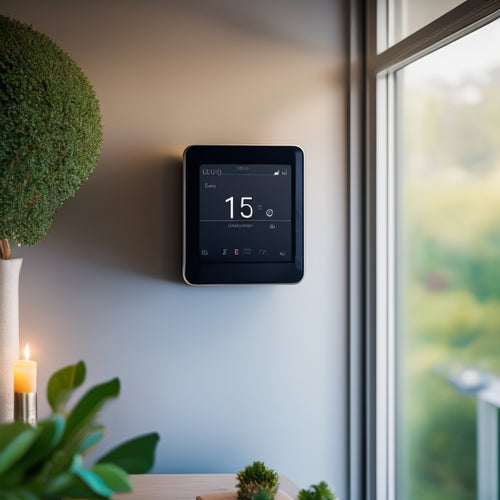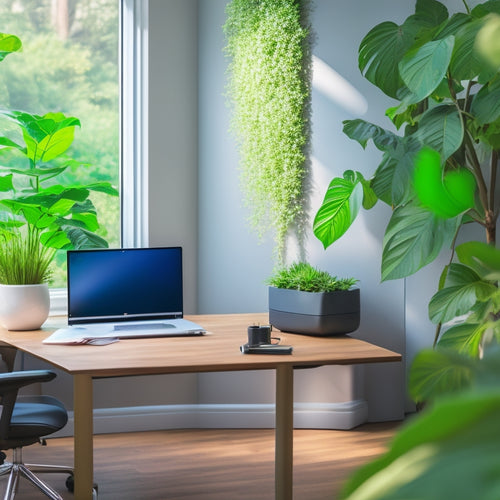
Why Harvest Rainwater for Your Hydroponic Garden?
Share
By harvesting rainwater for your hydroponic garden, you can greatly reduce your water bill, minimize chemical contamination, and promote sustainable gardening practices. Rainwater harvesting also insulates your garden against drought, preserves precious municipal water resources, and lowers energy consumption costs. Plus, it enhances plant growth naturally, allowing your crops to thrive in a healthier environment. By adopting this practice, you'll not only conserve this important resource but also take a step towards a more sustainable future. Uncover how you can maximize the benefits of rainwater harvesting for your hydroponic garden.
Key Takeaways
- Harvesting rainwater reduces water bills and promotes long-term cost savings by decreasing reliance on municipal water supplies.
- Rainwater is free from chemicals and additives, providing a healthier environment for crops and reducing environmental chemicals released into ecosystems.
- Rainwater harvesting conserves precious municipal water resources, reducing the risk of waterborne diseases and contaminants in hydroponic gardens.
- Capturing rainwater reduces energy consumption costs by minimizing treatment and transportation energy, and promotes sustainable gardening practices.
- Rainwater serves as a chemical-free water source, enhancing nutrient absorption and maintaining a neutral pH level, promoting healthy plant growth and development.
Reduce Your Water Bill
Regularly, hydroponic gardeners rely heavily on municipal water supplies, which can lead to a considerable increase in their water bills.
You, however, can break free from this costly dependence by harvesting rainwater for your hydroponic garden. By collecting and storing rainwater, you'll greatly reduce your water bill. This approach not only yields cost savings but also contributes to long-term sustainability.
With a rainwater harvesting system, you'll be less reliant on municipal supplies, which can be unpredictable and expensive. For instance, incorporating renewable energy solutions can further reduce your reliance on non-renewable energy sources and lower your overall operational costs.
Minimize Chemical Contamination
When you harvest rainwater for your hydroponic garden, you'll want to minimize chemical contamination to guarantee a healthy crop.
Conducting regular energy audits Evaluating Fleet Energy can also help identify areas for improvement in your water collection system.
You can reduce the risk of water pollution by keeping your collection system clean and free of debris.
Reduce Water Pollution Risk
You'll want to take steps to reduce water pollution risk in your hydroponic garden by minimizing chemical contamination. Chemical-laden water can harm your plants, contaminate the soil, and even affect local waterways.
By harvesting rainwater, you'll reduce the risk of chemical runoff and protect your garden's ecosystem health. Rainwater harvesting helps maintain ideal water quality by reducing the amount of chemicals, heavy metals, and other pollutants that can seep into the water supply.
Adopting renewable energy solutions, such as solar power, can also reduce your reliance on external energy sources, leading to a more sustainable gardening practice.
Collecting rainwater also decreases the amount of stormwater runoff, which can carry pollutants into nearby waterways and harm aquatic life.
Limit Chemical Exposure
By collecting and utilizing rainwater, you minimize the risk of chemical contamination in your hydroponic garden. This is because rainwater is free from the chemicals and pollutants often found in municipal water supplies.
Chemical contaminants can negatively impact water quality, affecting the health and productivity of your plants. By using rainwater, you reduce your reliance on chemical-laden water sources, creating a healthier environment for your crops.
Furthermore, integrating renewable energy sources, such as solar power integration, can further enhance the sustainability of your hydroponic garden. This approach also offers significant environmental benefits, as it reduces the amount of chemicals released into the environment.
Insulate Against Drought
When designing your rainwater harvesting system, you'll want to take into account three critical factors to guarantee your hydroponic garden remains resilient during dry spells.
First, you'll need to determine the ideal water storage capacity to carry your garden through extended periods of drought.
By integrating solar-powered charging solutions and selecting drought-resistant crops, you'll not only conserve water resources but also reduce your reliance on fossil fuels.
Water Storage Capacity
Determine your hydroponic garden's water storage capacity to guarantee a consistent supply during dry spells.
You'll want to evaluate factors like your garden's water usage, local rainfall patterns, and storage solutions that fit your space and budget.
To maximize your storage capacity, assess the following:
- Implementing a water filtration system to reduce water waste and extend the life of your stored water
- Investing in durable, food-grade storage tanks that can withstand the elements
- Designing a storage system that allows for easy water rotation and aeration to prevent stagnation
Drought-Resistant Crop Selection
You've guaranteed a reliable water supply for your hydroponic garden by maximizing storage capacity; now, it's time to focus on selecting crops that can thrive even when water is scarce. This is essential for maintaining crop resilience in times of drought.
By choosing drought-resistant crops, you'll confirm your hydroponic garden remains productive and sustainable, even during periods of water scarcity. Some ideal crops for hydroponic systems include leafy greens, herbs, and tomatoes, which have low water requirements and can tolerate some drought.
Additionally, consider implementing sustainable practices like crop rotation and companion planting to further enhance your garden's resilience.
Conserving Water Resources
Conserving water resources is essential to ensuring your hydroponic garden's long-term sustainability, especially during extended drought periods.
By harvesting rainwater, you're reducing your reliance on municipal water supplies, which can be unpredictable and costly. This approach also promotes sustainable gardening practices, minimizing your environmental footprint.
-
You'll reduce your water bill by leveraging free rainwater, which can be substantial in areas with low rainfall.
-
Rainwater harvesting helps maintain a consistent water supply, even during times of drought or water restrictions.
-
Collecting and storing rainwater reduces the risk of waterborne diseases and contaminants, ensuring a healthier growing environment for your crops.
Preserve Municipal Water Supply
Your municipal water supply is a precious resource, and harvesting rainwater for hydroponic gardens can play a significant role in preserving it.
By collecting and utilizing rainwater, you're reducing your reliance on municipal water, which is often treated and pumped over long distances. This approach helps conserve water resources, adopting sustainable practices that benefit both your garden and the environment.
Harvesting rainwater also reduces the strain on municipal water treatment facilities, allowing them to operate more efficiently.
Lower Energy Consumption Costs
Rainwater collection systems require less energy to operate compared to traditional water supply systems. This means you'll benefit from lower energy consumption costs, which is a significant advantage for hydroponic gardeners.
By capturing rainwater, you'll reduce your reliance on municipal water supplies, which often require a lot of energy to treat and transport.
Here are some ways rainwater collection promotes energy efficiency and sustainable practices:
-
Reduced pumping energy: You won't need to pump water from a municipal source or a well, which saves energy.
-
Lower treatment energy: Rainwater is free from chemicals and contaminants, reducing the need for energy-intensive water treatment processes.
-
Decreased transportation energy: Collected rainwater is readily available on-site, eliminating the need for energy-consuming water transportation.
Enhance Plant Growth Naturally
By utilizing rainwater for hydroponic gardens, you're not only reducing energy consumption costs but also creating an excellent environment for plants to thrive.
Rainwater is free from chemicals and additives found in municipal water supplies, which can disrupt nutrient balance and compromise soil health. This natural, chemical-free water source allows your plants to absorb essential nutrients more efficiently, promoting healthy growth and development.
Additionally, rainwater's neutral pH level won't alter your hydroponic system's delicate pH balance, ensuring ideal growing conditions.
Conserve This Valuable Resource
As the global water crisis continues to intensify, it's essential that you take proactive measures to conserve this precious resource. Harvesting rainwater for your hydroponic garden is a significant step towards sustainable gardening. By collecting and utilizing rainwater, you reduce your reliance on municipal water supplies, decreasing the strain on this limited resource.
Here are some key benefits of conserving rainwater:
- Reduces water bills and saves you money
- Decreases the amount of stormwater runoff, mitigating urban flooding and pollution
- Allows you to maintain a consistent water supply, guaranteeing your plants receive the water they need, even during droughts or water restrictions
Investing in a reliable rainwater filtration system guarantees the water is safe for your plants, giving you peace of mind and a thriving hydroponic garden.
Frequently Asked Questions
How Often Should I Clean and Maintain My Rainwater Harvesting System?
You should inspect your rainwater harvesting system regularly, ideally every 1-3 months, to guarantee proper function and water quality; create a maintenance schedule to stay on track and prevent clogs, corrosion, and contamination.
Can I Use Rainwater for My Entire Hydroponic Garden's Watering Needs?
You'll be fascinated to know that 1.7 billion people globally rely on rainwater harvesting! For your hydroponic garden, you can definitely use rainwater for your entire watering needs, as it offers numerous benefits, such as improved hydroponic efficiency and reduced water bills.
Do I Need to Treat the Harvested Rainwater Before Using It?
You'll need to treat harvested rainwater to guarantee ideal water quality for your hydroponic garden. Implementing effective filtration methods, such as UV treatment or sedimentation, will remove contaminants, providing a healthy environment for your plants to thrive.
Can I Harvest Rainwater in Areas With Low Rainfall?
You're not limited to rain-rich regions! Even in areas with low rainfall, you can harvest rainwater, albeit in smaller quantities. Invest in efficient rainwater storage systems to collect every precious drop, especially during drought conditions, and you'll be sipping from an oasis in no time!
Are There Any Specific Regulations for Rainwater Harvesting in My Area?
You'll need to research local guidelines governing rainwater harvesting in your area, as regulations vary; make certain you understand water quality standards to avoid contamination, and comply with rules to maintain your freedom to harvest rainwater.
Related Posts
-

Smart Energy: Greener Homes With Connected Power Devices
You can control and optimize your energy consumption with smart energy devices, reducing your carbon footprint by up ...
-

Why Grow Up? Vertical Gardens Transform Urban Living
As you change your urban living space, you're not just growing up - you're bringing nature back into the heart of the...
-

10 Best Energy-Efficient External Hard Drives for Sustainable Offices
When it comes to sustainable offices, you need external hard drives that balance data storage needs with energy effic...


